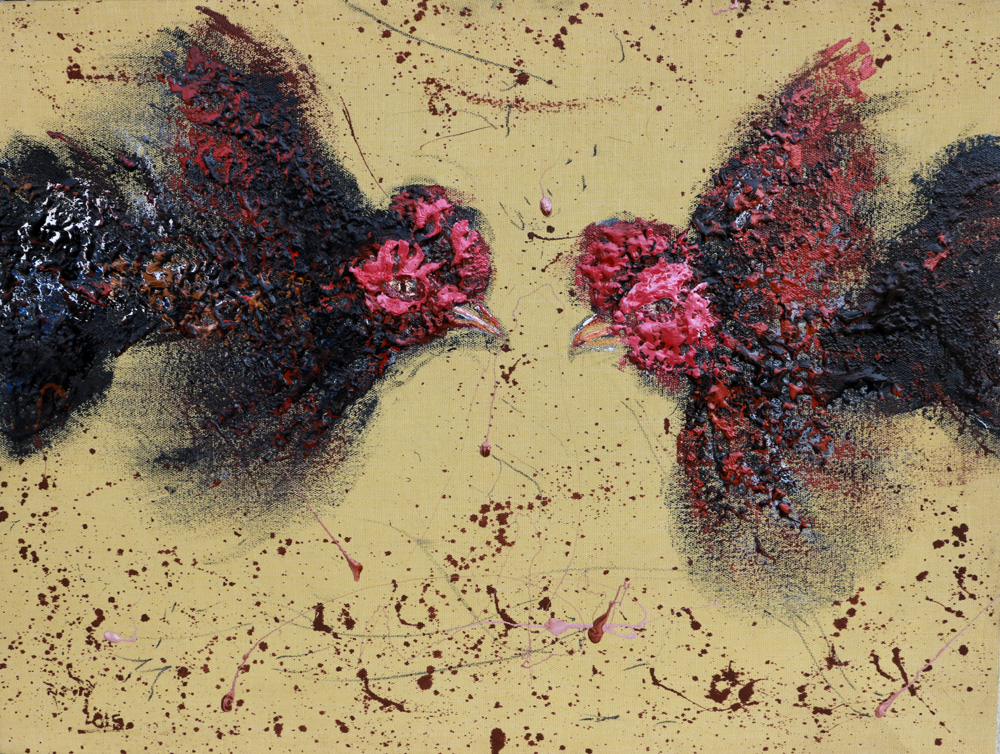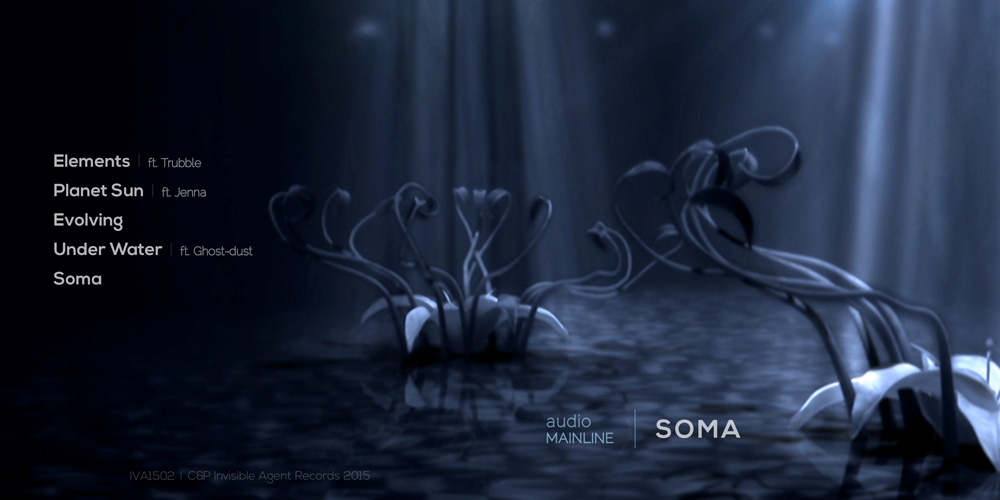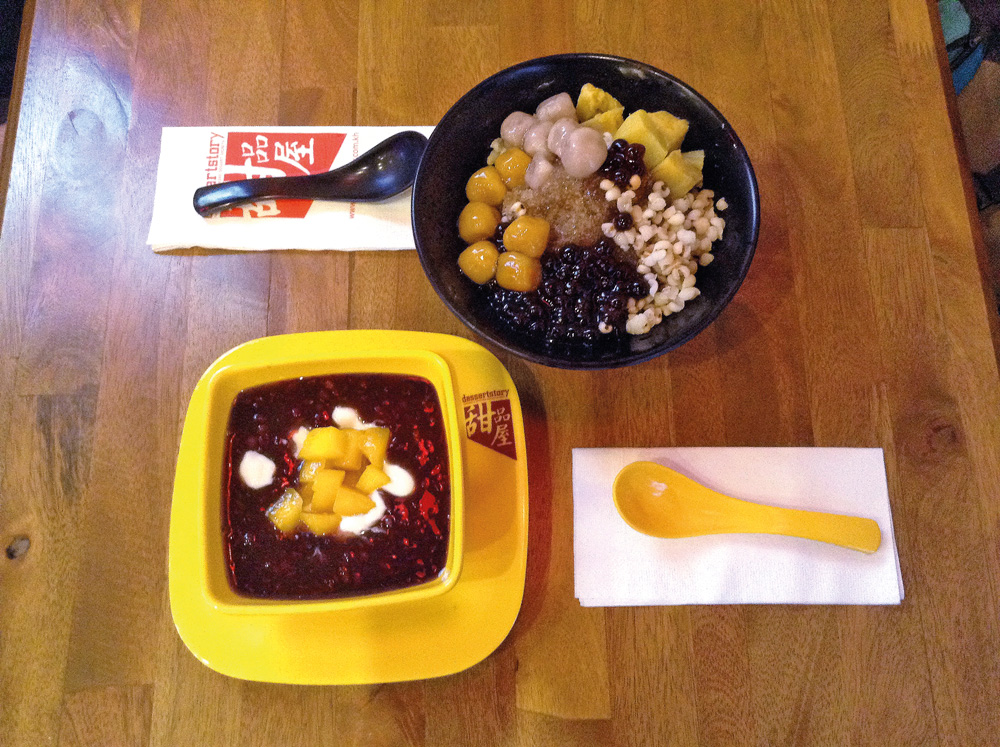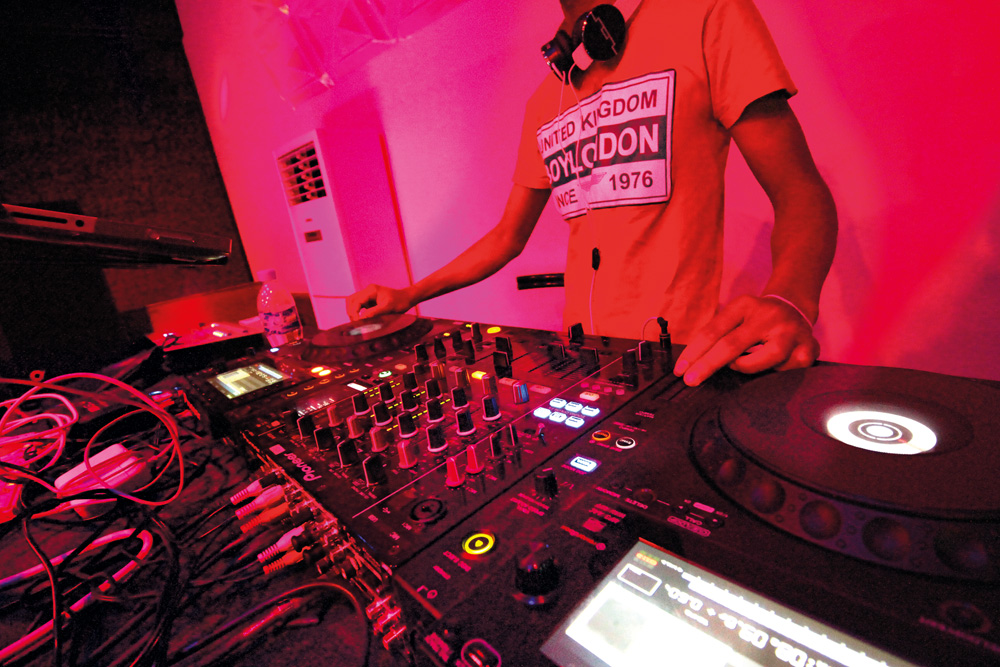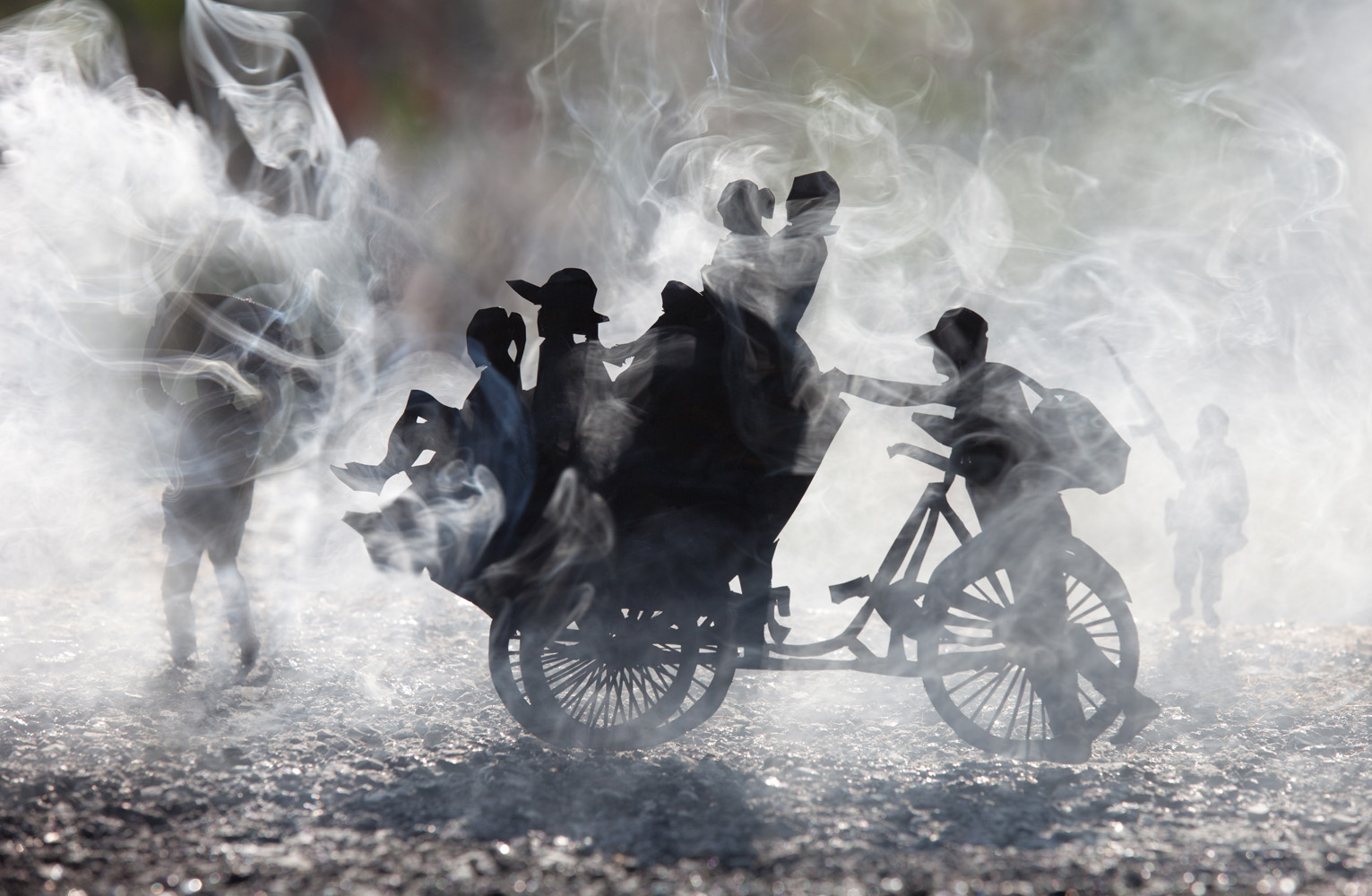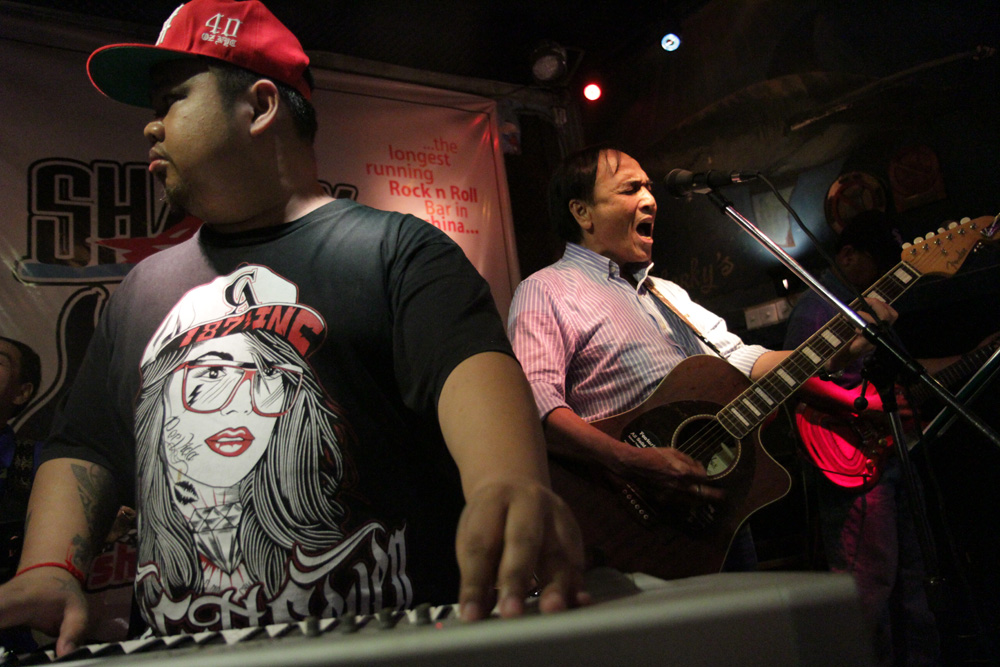Named after a Viking dragon ship, Drakkar has well and truly lived up to its namesake. Since its conception in 1967, the band has ridden waves of soaring successes and survived the crushing power of the Khmer Rouge regime. With members now in their 60s and 70s, Drakkar is ready to take their powerful rock on their first US tour.
…..
Few musicians can lay claim to forming a band that has persisted for almost five decades, creating the country’s highest selling album three times over, surviving the Khmer Rouge period and continuing on to play at sold out shows around the world. Vocalist and guitarist of the legendary Drakkar band, 63-year-old Touch Tana, recalls how it all transpired with sharp wit and humbling candour.
 Long hair, loud shirts and a lifelong promise
Long hair, loud shirts and a lifelong promise
Despite now being recognised and respected as one of the legendary musicians of the ‘70s, Tana makes no attempt to pretend that the rock star life came naturally to him.
“When I started, I knew only one song. The way I played the guitar was the worst – [lead guitarist/vocalist] Chhatha even said so!” Touch laughs. “I felt ashamed and I said, ‘Maybe I should not be a musician.’ But [bassist and vocalist] Molivan said, ‘No, no stay! You can learn to play the guitar like me.’ He’s the best musician of all Drakkar, too. So that’s how I learned.”
When Drakkar was formed in 1967 with its three other members, Touch Chhatha, Mam Molivan and Tan Phanareth, Tana was the youngest of the four, possessing significantly less experience and confidence than his elder bandmates.
“I felt very shy because I was only 16-years-old. And we were a travesty, you know! We had different clothes and hair. I grew my hair, cut my jeans. I felt funny doing it because I was so shy, and I came from an educated family.”
There was little time for Tana to become accustomed to his new role, however. No sooner had the band formed than they were asked to perform at a large party for the socially elite at the American Embassy. Pushed straight into the deep end, Tana managed to draw upon an inexplicable self-confidence in a moment of fear – a behaviour which not only salvaged the band’s first performance, but was later to save his own life.
“When I was backstage, no one knew who I was because I’d never played with them before. No one shook my hand. Everyone was like, ‘Who is this guy with the band?’” Tana recalls. “We were called onstage and I had to play electric guitar. I’d played acoustic, but I’d never played an electric guitar before that day. And we hadn’t rehearsed. No one even knew what song to start with. No one played anything and we all just stood there. Phanareth lost it – he got a little scared. But as the others became more scared, I became strong. I picked a song and said, ‘Okay, let’s play.’ The crowd was breathless – they just stood there with their mouths open.’”
From that point on, Tana became more serious about his role in the band. But having been raised in an educated, well-respected family, Tana’s ambition to play music professionally were at odds with the future his parents’ had in mind for their son. On the day his parents had promised to buy him a guitar as a result of doing well in an exam, Tana was forced to make a promise of his own that would forever change his life’s trajectory.
“When we went to get the guitar, my mother and father were really upset with me. It ended up being so expensive. My mother didn’t realise how expensive it was when she made the promise. When [the shopkeeper] told her it was 10,000 riels, my mother said to me, ‘No way! Are you stupid? Are you crazy? You want me to spend that amount of money on this?’ I said, ‘Mum, you promised. I need only one. I don’t need a motorcycle, I don’t need anything else.’ Finally, my parents agreed, but only on the condition that I promised never to become a professional musician – I was not allowed to make money from it. I kept my promise. To this day, I do not survive with making music.”
https://www.youtube.com/watch?v=CQkeBTJFHlc
Going solo
True to his word, Tana continued to perform with the band, but always alongside his own studies and never again with the aspiration to turn it into a career. In 1970, Drakkar split up to pursuit individual careers, some of which were military or governmental roles afforded by the Vietnam War. Tana’s experience and passion for the arts lead him to land a role developing a programme for a government radio station. It was here that Tana inadvertently produced the makings for what were to become the country’s highest-selling albums in 1971.
“I just started to play the first song I wrote, called Why Are You Angry? Then one of the agents started recording, but I didn’t know. I stopped playing, then later I heard him play the song back over and over, and I thought, ‘Who’s playing my song? How could another person have thought of the exact same tune as me?’” Tana lets out a long, wheezing laugh. “When I realised he had recorded me, I was so surprised. The agency asked me to write 20 songs for a cassette to record the next week. I ended up recording two cassettes that year for them.”
Never one to break a promise, Tana refused the offer to continue producing recordings for the company, and made a conscious effort to redistribute any profits earned from his musical successes.
“They wanted me to do many more, but I said no. I had my other work to do. Besides, if I started earning money from recording then it would have been a profession and I’ve promised not to do that. The moment I started earning money from it, I immediately spent it – on other musicians, their drinks, their food. I didn’t save any money from it. I just wanted to test out what I was capable of or not, and now I know I can do it.”
The two cassettes featured 40 songs in total, all of which were originals penned by Tana, but sung by guest musicians including Pen Ron and Mao Sareth. At one point, Tana was given the option of collaborating with the legendary singer Sin Sisamouth on his records. After much deliberation, Tana declined the offer, partly due to financial restrictions, but primarily because it conflicted with a particularly strong principle of his.
“Sin Sisamouth I love and respect so much.” Tana says. “He talked to me so sincerely and nicely even though I was just young and new in music. I wanted him to be in my cassette so much. But something for me to consider was this: why don’t we try other musicians out? Because Cambodians should have many different musicians, not just one. It doesn’t mean I don’t like Sin Sisamouth – he is the best. And that’s largely because he made many originals – he mostly did not copy. That’s why I respect him. And yet, people are always copying him now. Cambodia needs variety.”

A second shot
After finishing his contract with the recording agency, Tana was asked to tour Vietnam, playing music to soldiers in US military camps. The original members of Drakkar were now heavily preoccupied with commitments to work and family, so Tana collaborated with three new musicians for the shows: lead guitarist Som Sareth; drummer Ouk Sam Ath; and bassist Ouer Sam Ol. The tour catalysed the second instantiation of the Drakkar band.
“The musicans were all extremely talented. We went to Vietnam for six months. Again, not to do it professionally – I just wanted to try and see what it was like. We played Rolling Stones covers and things for both Cambodian and US soldiers and they really liked it. They danced and sang along. We loved the music, each other, and the way we all played together in Vietnam. So, a little while after we returned, we formed the second Drakkar. We were very popular. We were the first Cambodian band to play on TV.”
The restructured Drakkar band enjoyed newfound popularity with its different sound and, between 1972-73, recorded the band’s first album, Drakkar ‘74. Originally intended as a test record, the album suffered initial sales levels so low that Tana eventually dismissed the idea that it would ever become a hit and moved to Pailin to start a new business. In late 1974, Tana received a phone call from his brother announcing that the album had sold all 20,000 copies, making it the highest selling album for Cambodia to this point.
Producing another 20,000 copies, which sold out in a few months, the band intended to make another 20,000 immediately after. However, their creative endeavours, like all others at the time, were suddenly and brutally cut short as the Khmer Rouge regime took hold of the Kingdom.

Surviving on talent
Although he was openly recognised by most soldiers and villagers as a musician, Tana was one of three members of Drakkar who managed to survive the Khmer Rouge period. In fact, it was perhaps his gift for music that afforded him the opportunity to be spared – at least on one occasion.
“I met one group of soldiers and they had one guitar but they didn’t know how to play it. They were like monkeys with it.” Tana recalls quietly. “Then one day they asked me to teach them because they knew I could play. So I tuned it and played a Khmer revolutionary song and they liked it. Then one soldier asked me to play an old song. I said ‘No, it’s prohibited.’ He pleaded with me, ‘I just want to know what it sounded like. I promise no one will hear.’ So I started to play one of the Apsara songs, Annie. They liked it a lot and danced. They asked me to teach them so I did, just a little bit. They gave me boxes of cigarettes, let me eat with them and treated me quite well. But then, maybe two months later, all the soldiers swapped over and went to different sections and I never saw them again.”
With the changeover came an influx of unforgiving soldiers who controlled Tana’s commune with the typical cold-hearted, violent tyranny for which the regime was renowned. Tana was one of their chief targets.
“The new soldiers wanted to kill me. They set up stories to try to kill me all the time. The way they did it was by getting people to judge you and turn against you. I was set up to steal fish. Groups of villagers would take turns to collect fish from the lake. During one of my turns, one of the guys in my group cast the net and when the fish were hauled in he said, ‘Take one fish home for your family. Everyone takes one.’ ‘I said , ‘Aren’t you scared?’ But he assured me that it was okay, and I saw everyone take one. So I did. Then when I went into the room where we prepared to go home, the chief told me to stop on my way out. They checked me and found the fish, but not on the others. I was so shocked. I said, ‘But what happened to your fish?’ and they said, ‘Don’t try to blame us.’ I realised that everybody had released their fish, but they had not told me. They tricked me. I went to put the fish back but they said, ‘No keep it – eat one fish before you die.’”
Tana continues, leaning in with his voice lowered, “I knew they were going to come after me that night, but I didn’t tell my wife. We prepared the fish and ate it. At about 6:30pm, the sun set. I heard many people come and gather outside. The whole commune comes – a thousand people – because they all want to see the killing. The people jeering in the crowd were my friends. In fact, the man who had set me up was my old friend I had gone to school with. Once everyone had sat down for the meeting, they come knock on my hut. The young boy soldiers were singing, ‘Tonight we’re going to kill the man, cut open his belly and stuff it with grass.’ I tied one knife down each leg. I became brave. I don’t know why, but when I get very scared I become brave. Like I did that first time on stage – just like that.”
“I raised my hand and said to the crowd, ‘Do you allow me to say something before you kill me?’ They said ‘yes.’ I said, ‘Do you allow me to talk without interruption until I stop?’ They agreed. I said, ‘Thank you.’ So I talked. I talked non-stop for about two hours. I talked about every one of them. Because I knew that most others had stolen rice. I had checked all their houses before. I went everywhere, I was well prepared.
The crowd was so angry. They wanted to stop me but they could not because they had already promised. In the end, the chief told the villagers to go back home. Eventually, the chief went too, and then it was just me and my wife left. So we went home.”
Of course, not everyone was as fortunate as Tana. By the end of the regime, an estimated 90% of the country’s traditional musicians and the majority of its contemporary musicians were believed to have died at the hands of Pol Pot’s army. With them, most of the country’s music and film recordings, paintings and additional historical records of Cambodian art were lost.
 Gone but not forgotten
Gone but not forgotten
In early 2015, filmmaker John Pirozzi released the documentary “Don’t Think I’ve Forgotten,” which explores the Cambodian rock ‘n’ roll scene of the ‘60s and ‘70s. The film features archival footage of contemporary performances as well as interviews with musicians who survived the Khmer Rouge period, including Tana and his other surviving bandmates.
This year, Drakkar will be touring America to help promote the US premiere of the film. “I really appreciate what John did,” Tana says with a smile. “He did a very good job. He really revealed the good of Cambodia and the strength of the people he interviewed. And with the film, our music is now being shown in a top place in the world. We’re very excited.”
Drakkar will play their last gig in Cambodia before heading to the US at 8pm, Friday March 27 Sharky Bar, #126 St. 130. Free entry
